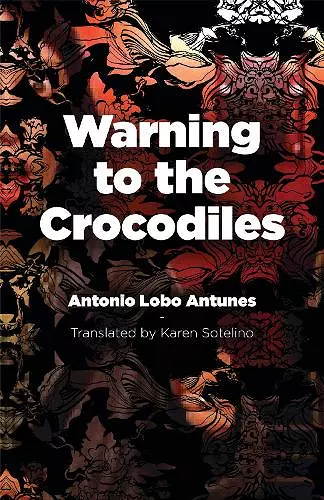Warning to the Crocodiles
Antonio Lobo Antunes author Karen C Sherwood Sotelino translator
Format:Paperback
Publisher:Dalkey Archive Press
Published:14th Oct '21
Should be back in stock very soon

Set in the aftermath of the “Carnation Revolution” of April 25, 1974, Antonio Lobo Antunes’s Warning to the Crocodiles is a fragmented narrative of the violent tensions resulting from major political changes in Portugal.
Told through the memories of four women who spend their days fashioning homemade explosives and participating in the kidnap and torture of communists, the novel details the clandestine activities of an extreme right-wing Salazarist faction resisting the country’s new embrace of democracy.
Warning to the Crocodiles (Exortação aos Crocodilos) has won:
- Best Novel by the Portuguese Writers Association (Grande Prémio de Romance e Novela da Associação Portuguesa de Escritores) (1999)
- The D. Dinis Prize of the Casa de Mateus Foundation (Prémio D. Dinis da Fundação Casa de Mateus) (1999)
- The Austrian State Literature Prize (Prémio de Literatura Europeia do Estado Austríaco) (2000)
"Antunes is definitely a writer worth reading for his literary talent and his insights into Portugal's history, geography, and national character." * Publishers Weekly *
"His themes are reminiscent of Faulkner's and Celine's, and his style is as complex as Proust's." * Library Journal *
“He’s been compared to Faulkner, Dos Passos, García Márquez, Céline, Cormac McCarthy, Malcolm Lowry, Proust, Woolf, Canetti, Gogol, Camus, Cortazar, and Nabokov. The real challenge for reviewers is coming up with a new Master of World Literature Antunes hasn’t been compared to.” * Quarterly Conversation *
“Considered by many to be Portugal’s greatest living writer, António Lobo Antunes' relative obscurity in the English-speaking world is something of an enigma....The author of 23 novels, and still...turning them out with unerring industriousness, Lobo Antunes is quite a big deal in Portuguese-, Spanish- and French-speaking countries. He has his illustrious champions too: George Steiner calls him “a novelist of the very first rank…an heir to Conrad and Faulkner;” no less a canon-builder than Harold Bloom says Lobo Antunes is “one of the living writers who will matter most...." * The Millions *
“Lobo Antunes’ sketches are alive with the poetry of the everyday, and tinged with the gentlest of self-mockery.” * J M Coetzee *
"Lobo Antunes, one of the most skillful psychological portraitists writing anywhere, renders the turpitude of an entire society through an impasto of intensely individual voices." * New Yorker *
"[Lobo Antunes] aims, like Joyce’s Stephen Dedalus taking upon himself the woes of Ireland, to be a national conscience, reminding his newly Europeanized, sleekly prosperous compatriots of their shaming past—a legacy of guilt left by the dictatorship of António de Oliveira Salazar, who ruled the country from 1932 to 1968, and by the brutality of his colonial regime in Africa. The Portuguese have officially chosen to forget this era of suffocating oppression, when the Catholic Church unctuously sanctified the strictures of a Fascist state. Lobo Antunes assails the moral cowardice of those who tolerated persecution or quietly collaborated with Salazar’s secret police, and is disgusted by Portugal’s recent veneer of affluence and spendthrift hedonism. A novel always reveals to us the world inside someone else’s head. In the case of Lobo Antunes, that world is the size of a country—small and marginal, perhaps, but teeming with villainy and vice, and as crammed with wounds and festering sores as an overcrowded hospital ward." * The New Yorker *
ISBN: 9781943150137
Dimensions: unknown
Weight: unknown
377 pages